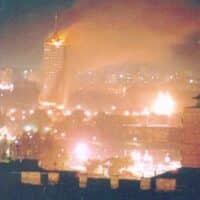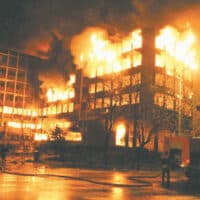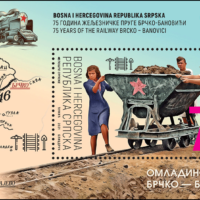-
Nato’s insatiable expansionism: The bombing of Yugoslavia 25 years on
Nato’s war against Yugoslavia in 1999 was a prelude to the war in Ukraine, says Dragan Plavšić.
-
NATO/CIA false flag operation in Račak in 1999 set precedent for similar operations in Syria and Ukraine that were designed to create a pretext for military intervention
Clinton administration claimed Serbian forces massacred civilians when deaths at Račak resulted from fighting between Serbian Army and terrorist Kosovo Liberation Army (KLA), which Washington supported
-
A brutal system replaced socialist health care in Europe
Matthew Read, researcher at the IF DDR, talks to the People’s Health Dispatch about similarities between East Germany’s and Yugoslavia’s socialist health systems and the lessons to be learned from these systems.
-
NATO’s 1999 aggression against Yugoslavia: Global turning point
This March 24th, the Belgrade Forum for a World of Equals, Generals and Admirals Association of Serbia, Veterans Association SUBNOR of Serbia and some other independent associations and think tanks, will mark the 24th anniversary of NATO’s aggression against Serbia and Montenegro (the Federal Republic of Yugoslavia), honoring heroes fallen in the defense of the country as well as all the victims of this illegal and criminal act.
-
We make the railroad; the railroad makes us
In 1947, thousands of youth brigade volunteers from around the world joined their Yugoslav comrades in the hills of Bosnia to build a railroad. As the most popular song from the construction sites put it, not only were these activists making a railroad, but the railroad made them.
-
NATO’s war against Yugoslavia: the ghost that still haunts Europe
NATO’s war against Yugoslavia: the ghost that still haunts Europe
-
Key U.S. ally indicted for organ trade murder scheme
If the people of Kosovo can hold the CIA-backed gangsters who murdered their people, sold their body parts and hijacked their country accountable for their crimes, is it too much to hope that Americans can do the same and hold our leaders accountable for their far more widespread and systematic war crimes?
-
The Imperial War Museum in London: A Lesson in State Propaganda?
In January 2016, I attended Tate Britain’s Artist and Empire: Facing Britain’s Imperial Past, a disappointing exhibition that in spite of its title did not face Britain’s past in any meaningful way. On the contrary, as I argued in my review, it shied away from this bloody history in favour of quasi-glorification, non-committal wording and […]
-
Bombs for Peace: A Review
George Szamuely. Bombs for Peace: NATO’s Humanitarian War on Yugoslavia. Amsterdam: Amsterdam University Press, 2013 (Distributed in the U.S. and Canada by the University of Chicago Press). Paper. Pp. 611. In Bombs for Peace, George Szamuely, a senior research fellow at the Global Policy Institute at London Metropolitan University, has produced a revealing and sharply […]
-
Immigrants, Welcome and Unwelcome
A silent three-year-old, lying drowned on a Turkish beach; the tearful protest of a Syrian man as he, his wife and baby are torn from the tracks next to a locomotive by Hungarian police; desperate families jammed into tiny, leaky boats, hoping to reach Europe alive or, if they do, facing ever new obstacles from […]
-
German Know-Nothings Today
“I don’t know.” Those words, often repeated 160-odd years ago in the USA, earned the gang of those using them the nickname “Know-Nothing Party.” Those were no expressions of intellectual modesty; party doings were secret, so members were not supposed to disclose anything about them, but just say, “I don’t know.” Their patriotic title was […]
-
Vulliamy and Hartmann on Srebrenica: A Study in Propaganda
In their recent article on “How Britain and the US Decided to Abandon Srebrenica to Its Fate” (Observer, July 5, 20151), Ed Vulliamy, a veteran reporter for the Guardian and Observer newspapers, and Florence Hartmann, a reporter and former spokesperson for the Office of the Prosecutor at the International Criminal Tribunal for the Former Yugoslavia […]
-
Berlin, July 1, 1990 — Athens, July 1, 2015
In a recent news video I watched people pushing and shoving at a bank entrance. I immediately recalled another scene, also with people pushing at a bank entrance. In the older scene people looked eager and gleeful, pushing so hard, I believe, that one man’s rib was broken. In the recent pictures they looked very […]
-
The Kagame-Power Lobby’s Dishonest Attack on the BBC 2’s Documentary on Rwanda
On October 1, 2014, a remarkable event occurred in Britain. The British Broadcasting Corporation’s BBC 2’s This World telecast Rwanda’s Untold Story, a documentary produced by Jane Corbin and John Conroy that offered a critical view of Rwandan President Paul Kagame and of his and the British and U.S. roles in the 1994 mass killings […]
-
On Taking Risks and Eating Crow
A long, warm, coatless autumn made some wonder whether climate change might cancel winter this year in a reverse of the canceled summer two centuries ago in a year called “Eighteen Hundred and Froze to Death.” But no, I now read that the weather will change after all. Northern blasts may soon be here. Perhaps […]
-
Bhagat Singh: Eighty-Three Years On
Chaman Lal. Understanding Bhagat Singh. Delhi: Aakar, 2013. pp. 245. Left Traditions in South Asia Bhagat Singh is to South Asia what Che Guevara is to Latin America — a popular iconic figure who continues to inspire generations of youth in the subcontinent in their struggles against imperialism and the trajectory of national politics after […]
-
Russia and the Ukraine Crisis: The Eurasian Project in Conflict with the Triad Imperialist Policies
Moscow, March 2014 1. The current global stage is dominated by the attempt of historical centers of imperialism (the US, Western and Central Europe, Japan — hereafter called “the Triad”) to maintain their exclusive control over the planet through a combination of: so-called neo-liberal economic globalization policies allowing financial transnational capital of the Triad to […]
-
Ukraine Between “Popular Uprising for Democracy” and “Fascist Putsch”
Let’s begin with Prime Minister Stephen Harper’s version. One can think what one likes about deposed Ukrainian President Viktor Yanukovich, but his election in 2012 was recognized as legitimate by international observers and, after a certain hesitation, by the defeated candidate, Yulia Timoshenko. In fact, relatively honest elections were just about the only positive […]
-
Interdom at Eighty: Reflections in Russia, on Dreams Old and Renascent
Russia, as travelers have noted over the centuries, is immense. Most of it is far from large bodies of water. And yet, in a first visit after many years, I came upon some unusual islands right in the heart of the country. But they were not islands in the geographic sense. Some were children’s islands. […]
-
The Sargasso Manuscript: Some Observations on Susan Sontag’s As Consciousness Is Harnessed to Flesh: Journals and Notebooks, 1964-1980
Susan Sontag. As Consciousness Is Harnessed to Flesh: Journals and Notebooks, 1964-1980. Edited by David Rieff. New York: Farrar, Straus and Giroux, 2012. I. David Rieff has played the last of Susan Sontag’s jokes upon the reader: to remain austerely cool, distant, and unsympathetic toward us even in “journals and notebooks.” The barbed wire of […]


![Burials in Račak after the 1999 massacre. [Source: news.bbc.co.uk]](https://mronline.org/wp-content/uploads/2023/07/Screenshot-2023-07-10-at-25112-PM-200x200.png)




